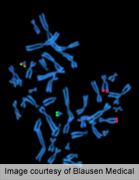
TUESDAY, Jan. 22 (HealthDay News) — A new blood-based genetic test may predict the presence of dangerous BRCA1 or BRCA2 gene mutations in women, a new study finds.
These mutations significantly boost the risk for breast or ovarian cancer, which often develop at an early age in women with the mutations.
The screen could provide a quick, affordable alternative to current genetic testing and may help women and their doctors make decisions about ways to reduce cancer risk, according to the authors of the study, published Jan. 22 in the journal Cancer Prevention Research.
“The current tool for mutation detection is gene sequencing [mapping], which is expensive, time-consuming and, in many cases, lacking clear and decisive clinical decision-making information,” study author Dr. Asher Salmon, a breast cancer specialist at the Hadassah Hebrew University Medical Center in Israel, explained in a journal news release.
“In many cases, the current sequencing tool identifies a mutation, but we do not know if the mutation is neutral or harmful,” Salmon noted.
The researchers developed the multiple gene expression profile test after analyzing mutated BRCA1 and BRCA2 genes from blood samples taken from otherwise healthy women. They said that the test is highly accurate, affordable and quick.
“In wealthy societies, it can become a screening tool for identifying individuals with a very high susceptibility for carrying a mutation,” so that they can be sent on to more rigorous, full DNA mapping, Salmon said. “In societies in which sequencing is not feasible, this test can substitute for it with a very high accuracy rate.”
The effectiveness of the test in different racial/ethnic groups will be assessed in a large study in Europe and North America, the researchers said.
More information
The U.S. National Cancer Institute has more about the BRCA1 and BRCA2 genes.

